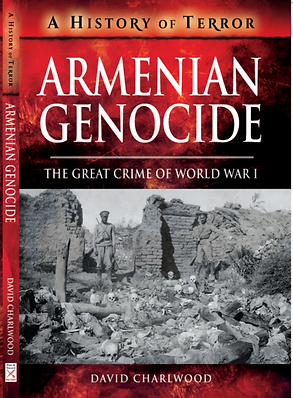History Books

1920:
A Year of Global Turmoil
Violent uprisings are tearing apart the Middle East, nationalism is on the march in Europe and an unlikely presidential candidate is running for election in the US on a populist platform to put 'America first'. The year is 1920.
1920: A Year of Global Turmoil tells the story of twelve months that set in motion one hundred years of history. From America to Asia, the events of 1920 foreshadowed the decline of empires, the coming of another global conflict and the rise of an American president who would change his country's relationship with the world. Weaving personal accounts with grand narrative, it vividly illuminates a past which echoes the present
"A remarkable panorama ... History at its best, narrated in gripping style."
- Peter Caddick-Adams, author of Sand & Steel
"Charlwood immerses the reader in the events of a tumultuous year in which hopes for a new post-war order everywhere crumble. Well-researched and engagingly written."
- Matthew Parker, author of Monte Cassino
"History writing at its best, 1920 informs, entices and challenges, teasing out extraordinary parallels between our current world and that of a century ago."
- Tim Butcher, author of Blood River

Churchill and Eden
Partners through war and peace
Friends, rivals, confidants: for more than two decades, Winston Churchill and Anthony Eden worked closely together. But while one is revered as a great leader and national icon, the other is remembered as the architect of Britain's worst foreign policy failure.
Churchill and Eden tells the story of the relationship between two men who led Britain through war and peace. The narrative ranges from the sunny south of France to the deserts of Africa and the jungles of Vietnam, covering the eras of the Second World War, the decline of Britain's Empire and the coming of the Cold War – and reveals a new perspective on the lives and decision-making of two of the most well known political figures of the Twentieth Century.
"A fine account of Anthony Eden's 'close, enduring and sometimes contentious relationship with Winston Churchill" - The Churchill Project

Suez Crisis 1956
The end of Empire and the reshaping of the Middle East
In 1956, Egyptian president Gamal Abdul Nasser nationalised the Suez Canal, ending nearly a century of British and French control over the crucial waterway.
Ignoring U.S. diplomatic efforts and fears of a looming Cold War conflict, British Prime Minister Anthony Eden misled Parliament and the press to take Britain to war alongside France and Israel. In response to a secretly pre-planned Israeli attack in the Sinai, France and Britain intervened as ‘peacemakers’. The invasion of Egypt was supposed to restore British and French control of the canal and reaffirm Britain's flagging prestige. Instead, the operation spectacularly backfired, setting Britain and the United States on a collision course that would change the balance of power in the Middle East.
The combined air, sea and land battle witnessed the first helicopter-borne deployment of assault troops and the last large-scale parachute drop into a conflict zone by British forces. French and British soldiers fought together against the Soviet-equipped Egyptian military in a short campaign that cost the lives of thousands of soldiers, along with innocent civilians.
Suez Crisis: 1956 is a fast-paced, compelling short history which moves between London, Washington and Cairo to tell the story of a crisis which brought down a prime minister and heralded the end of an empire.

Armenian Genocide
The Great Crime of World War 1
Crammed into cattle trucks and deported to camps, shot and buried in mass graves, or force-marched to death: over 1.5 million Armenians were murdered by the Turkish state, twenty years before the start of Hitler’s Holocaust. It was described as a crime against humanity and Turkey was condemned by Russia, France, Great Britain and the United States. But two decades later the genocide had been conveniently forgotten. Hitler justified his Polish death squads by asking in 1939: ‘Who after all is today speaking about the destruction of the Armenians?’
Armenian Genocide is a new, gripping short history that tells the story of a forgotten genocide: the men and women who died, the few who survived, and the diplomats who tried to intervene.



